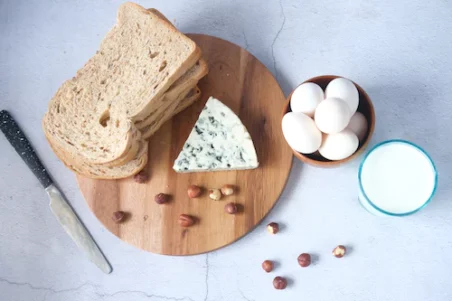Veganism is a lifestyle choice that involves avoiding the use of animal products for food, clothing, and any other purpose. This means that vegans do not eat meat, fish, eggs, dairy, or any other animal-derived products. Instead, they consume plant-based foods such as fruits, vegetables, grains, nuts, and seeds.
What is Dairy?
Dairy refers to any product that is derived from milk, including cheese, yogurt, butter, and cream. Dairy is a common ingredient in many food products, and it is also used as a primary source of calcium and other nutrients in the diet.
Can Vegans Consume Dairy?
No, vegans cannot consume dairy because it is an animal product. As mentioned earlier, veganism involves avoiding any use of animal products, and dairy is no exception. Although dairy is a good source of calcium and other nutrients, there are plenty of plant-based alternatives that can provide the same benefits.
Why Do Vegans Avoid Dairy?
There are several reasons why vegans avoid dairy. The first reason is that dairy production involves the exploitation of animals. Cows are kept in cramped conditions and are often subjected to cruel treatment to maximize milk production. Vegans believe that it is unethical to use animals for human purposes and choose to avoid all animal products, including dairy.
The second reason why vegans avoid dairy is that it is not necessary for good health. While dairy is a good source of calcium and other nutrients, there are plenty of plant-based alternatives that can provide the same benefits. Vegans can consume foods such as leafy greens, nuts, and fortified plant milks to meet their nutritional needs without consuming dairy.
What Are the Benefits of a Dairy-Free Diet?
There are several benefits to following a dairy-free diet, including:
- Reduced Risk of Health Problems
Consuming dairy has been linked to an increased risk of health problems such as heart disease, type 2 diabetes, and certain types of cancer. By eliminating dairy from their diet, vegans can reduce their risk of developing these health problems.
- Improved Digestion
Many people are lactose intolerant, which means they cannot digest dairy products properly. This can lead to digestive problems such as bloating, gas, and diarrhea. By eliminating dairy from their diet, people with lactose intolerance can improve their digestion and reduce these symptoms.
- Environmental Benefits
Dairy production is a major contributor to greenhouse gas emissions and water pollution. By eliminating dairy from their diet, vegans can reduce their environmental footprint and help to protect the planet.
What Are Some Dairy-Free Alternatives?
There are plenty of dairy-free alternatives that vegans can consume to meet their nutritional needs. Some of these alternatives include:
- Plant Milks
Plant milks such as almond milk, soy milk, and oat milk are excellent sources of calcium and other nutrients. They can be used in the same way as dairy milk and are a great alternative for people who are lactose intolerant.
- Nutritional Yeast
Nutritional yeast is a type of yeast that is high in protein and B vitamins. It has a cheesy flavor and can be used as a substitute for cheese in many recipes.
- Tofu
Tofu is made from soybeans and is a good source of protein and calcium. It can be used as a substitute for cheese in many recipes.
How to Transition to a Dairy-Free Diet
Transitioning to a dairy-free diet can be challenging, especially if you are used to consuming dairy on a regular basis. However, there are several steps that you can take to make the transition easier. Some of these steps include:
- Gradual Elimination
One of the easiest ways to transition to a dairy-free diet is to eliminate dairy products gradually. Start by eliminating one or two dairy products from your diet at a time and replacing them with plant-based alternatives.
- Experiment with Plant-Based Alternatives
There are plenty of plant-based alternatives to dairy products, and it’s important to experiment with them to find the ones that you like. Try different types of plant milks, cheeses, and yogurts to find the ones that work for you.
- Read Food Labels
Dairy is a common ingredient in many processed foods, so it’s important to read food labels carefully to identify any hidden sources of dairy. Look for terms such as whey, casein, and lactose, which are all derived from milk.
Get Support
Transitioning to a dairy-free diet can be challenging, so it’s important to get support from friends and family members. Joining a support group or finding an online community of vegans can also be helpful.
Common Misconceptions About Dairy-Free Diets
There are several misconceptions about dairy-free diets that may make it difficult for people to make the transition. Some of these misconceptions include:
Dairy is the Only Source of Calcium
Many people believe that dairy is the only source of calcium, but this is not true. There are plenty of plant-based sources of calcium, including leafy greens, nuts, and fortified plant milks.
Dairy-Free Diets are Low in Protein
Some people believe that dairy-free diets are low in protein, but there are plenty of plant-based sources of protein, including beans, lentils, tofu, and tempeh. In fact, many plant-based diets are rich in protein and can provide all of the protein that the body needs.
Conclusion
In conclusion, a vegan diet is dairy-free by definition, but not all dairy-free diets are vegan. Whether you choose to eliminate dairy for ethical, health, or environmental reasons, transitioning to a dairy-free diet can be challenging, but it is possible with the right tools and support. By gradually eliminating dairy products, experimenting with plant-based alternatives, reading food labels, and getting support from others, you can successfully make the transition to a dairy-free lifestyle. And with plenty of plant-based sources of calcium and protein available, there’s no need to worry about missing out on these important nutrients.

